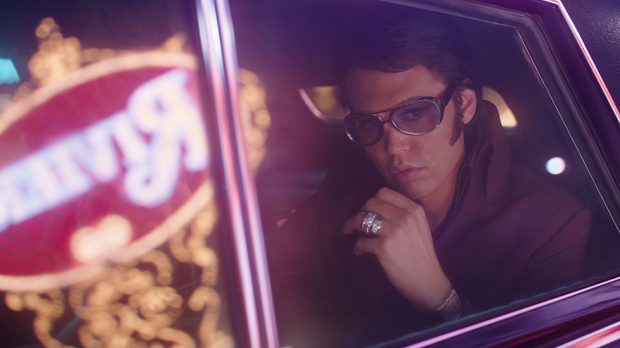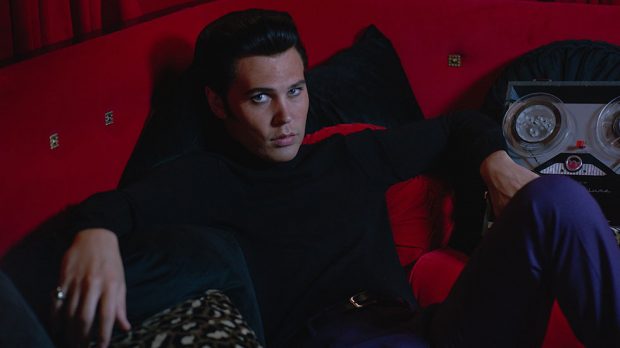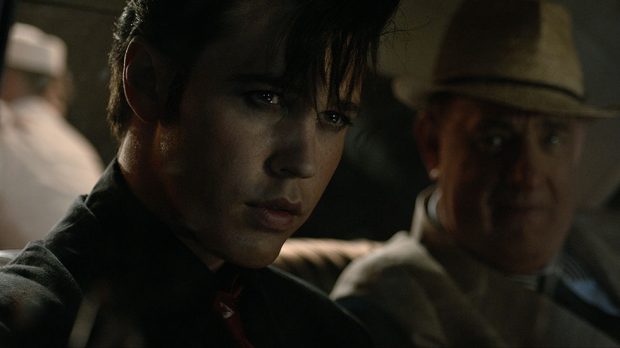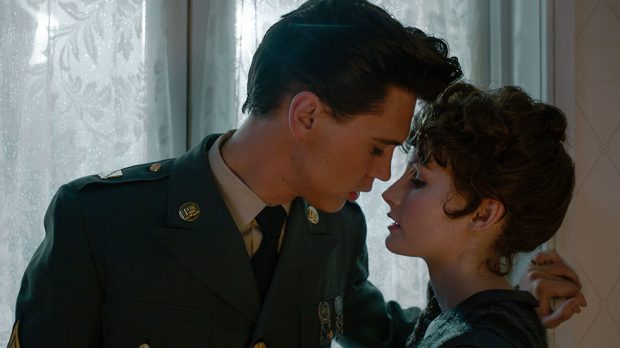
Directed by Baz Luhrmann
Starring Austin Butler, Tom Hanks, Alton Mason, David Wenham
While Elvis may be the title character, this film is absolutely the story of two men. The musician, and his promoter, Colonel Tom Parker. Tom Hanks’ performance as con man Colonel Parker is a skilful portrayal of a villain you will hate from the opening lines. He is the bitter, narcissistic narrator whose accent seems designed to grate on your nerves. There is no redeeming feature, no moments of kindness. Hanks has chosen a role to test his nice guy image, and he pulls off evil so well. Case in point is as Elvis is being hauled off to jail, the Colonel is worried about protecting the merchandise. Manipulative and arrogant, you will want to slap him before the film is finished.

Austin Butler in the title role is a breakthrough performance. His voice is so smooth, each mannerism so perfect, each costume so carefully replicated, that he is almost indistinguishable from the real thing. Just as you would want from a biopic.
There are wonderful performances by the supporting cast including Olivia DeJonge as Priscilla Presley, Richard Roxburgh and Helen Thomson (both Australian) as Elvis’s parents, David Wenham (again, Aussie) as prudish musician Hank Snow, and Dacre Montgomery (WAAPA Alumni) as Steve Binder. However, all these great performances are overshadowed by Butler and Hanks. They are but minor planets orbiting two suns.

There is little joy or hope in this movie, making it be depressing at times. There are light-hearted moments early on, as ‘Elvis the pelvis’ discovers his hip-shaking talents in Louisiana, much to the delight of the female audience who quickly discover some new hip-shaking delights of their own. After that, it spirals further and further downwards in reflection of Elvis’ tormented talent.
As a film, Elvis lacks moments of light to give shape to the darkness. It just plummets too soon and too fast. Elvis’ story does have opportunities for joy – such as his early marriage and daughter – both of which are hurried past in a montage with a cruel voiceover by the Colonel. In moments like these you want to shout “stop” and take an intermission, but as they say in the film “if you don’t do the business, the business will do you”.
The frantic and fractured cinematic style used in the film emulates Elvis’ career and life. Split screens pull your eyes in multiple directions, with the editing chopping and changing endlessly. Spinning camerawork and shifting focus increase the confusion like a brutal kaleidoscope that feels overdone by the one-hour mark. It is difficult to connect with the characters when your eyes are darting all over the place, and it’s only in the brief moments Elvis stands up for himself do we get the slightest break from the visual cacophony.

Elvis could take notes from recent musical biopic successes of Rocketman and Bohemian Rhapsody. All three are similar tales of the excess of rock and roll, the drugs and debauchery, and the recreation of one famous man’s story. Yet in the tales of Freddie Mercury and Elton John, there is a celebration of the music – and it is the music which gives us moments of passion, joy, and revelry.
In Elvis, there is no love for the music. Many of the tracks are cut short, or interrupted by the Colonel’s voiceovers, or pushed to the background while other action takes the main screen. There is a clever addition of a few modern hip-hop tracks, which add to the sense of busyness and chaos when contrast with the slow swing of blues and soul, but Elvis’ music feels lost when it should be the star, and is instead secondary to the battle of personalities and power.

One point where the movie succeeds is correctly acknowledging the origins and true ownership of Elvis’ music by African American artists, which like almost all rock and roll of the time, was appropriated by white performers. The film also spotlights Elvis’ exposure to revival churches in the deep south, Beale Street Memphis clubs, and his time spent with big name artists. The performances by Alton Mason as Little Richard and Kelvin Harrison Jr. as a young BB King are brilliant. As BB King says to Elvis “If you do [take Little Richard’s song and perform it] you’ll make more money than that boy could ever dream of.”
Elvis is another Baz Luhrmann success, but it still doesn’t make for an enjoyable film you would want to watch again.
MELISSA MANN
Notifications